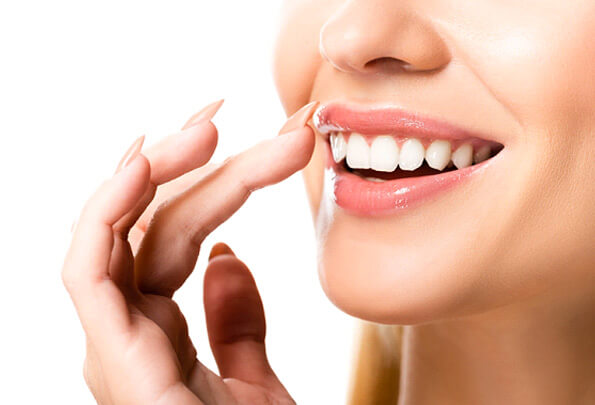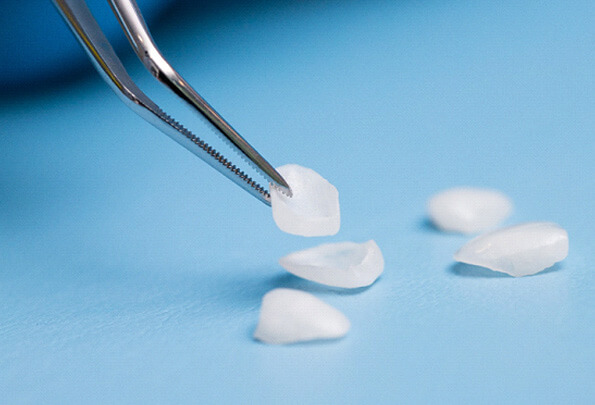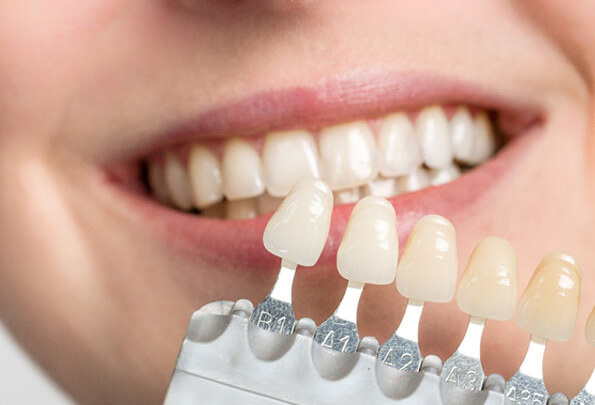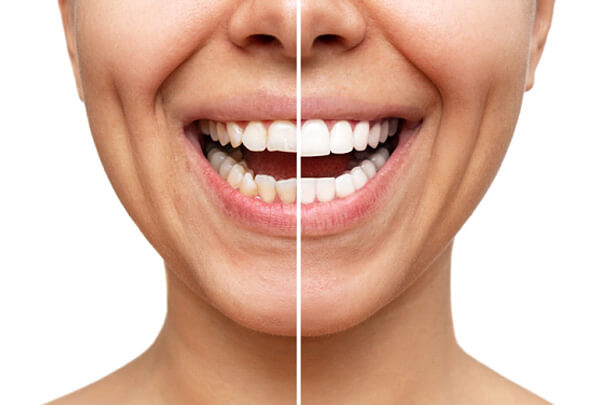Veneers – Everett, WA
Mask Imperfections to Perfect Your Smile

Did you know that people with dental problems are more likely to report feeling anxious, depressed, or unworthy? That means having chips, cracks, discoloration, or gaps in your grin can hold you back if you’re overly worried about how people will perceive you. You might even find yourself avoiding social situations where you would have to engage with others. Fortunately, Dr. Kaopua can mask imperfections to perfect your smile with porcelain veneers. Continue reading below to learn more about this popular cosmetic treatment, and feel free to contact us if you have additional questions.
Why Choose Albright Family Dental for Veneers?
- Lifelike, Tooth-Colored Materials
- Flexible Financing Available
- Advanced Technology for Enhanced Accuracy
What Are Dental Veneers?

Veneers are used to hide minor issues that impact the way you look. Essentially, they’re thin covers made of durable materials, like porcelain or resin, that are bonded to the front surface of your tooth. Because they can be color-matched to your natural teeth, no one will notice the difference. On top of that, they’re less porous than your natural pearly whites and so are better able to resist potential chips and stains down the road.
You might benefit from veneers if you have:
- Small gaps or spaces between your teeth.
- Discoloration or stains that can’t be whitened.
- Small cracks or chips.
- Slight overcrowding.
- Teeth that are worn down, misshapen, or too small for your mouth.
The Process of Getting Veneers

Before you can proceed with veneers, you’ll have to schedule a consultation with Dr. Kaopua. He’ll learn more about your dental concerns and goals, then examine your mouth to determine whether this option is the best method to address them. He’ll also ensure there are no current issues like cavities or gum disease that can impact your results.
Then, if he determines that you’re a good candidate, he’ll need to prepare your teeth so the shells line up correctly against your gums. This involves using a specialized instrument to remove a small amount of enamel (no thicker than a contact lens). Then, with the help of digital X-rays and scanning, he’ll take an accurate impression of your mouth which will be sent to a dental laboratory to create your fully customized prosthetics. This can take a couple of weeks, so you may be offered a temporary set in the meantime to protect your grin while you wait.
Once they’re delivered to our office, we’ll schedule another appointment to try them on and make any last-minute adjustments before bonding them to your teeth.
The Benefits of Veneers

There are many advantages to getting veneers in Everett, such as:
- Longevity. They can last 15+ years when they’re cared for properly which makes them an excellent long-term solution.
- Durability. They’re coated with a glaze that’s strong enough to protect the underlying tooth from possible cracks, chips, and stains.
- Versatility. These covers can be used to hide one or several imperfections simultaneously.
- Natural look and feel. Porcelain reflects light in a way that mimics enamel so no one will know the difference.
- Minimally invasive. Only a small amount of surface preparation is required for this procedure.
Understanding the Cost of Veneers

Unfortunately, most dental insurance plans don’t cover veneers because they’re considered a cosmetic treatment that’s intended to enhance your appearance. We believe that your budget shouldn’t keep you from having the smile you deserve, though! To help make this service more affordable, we proudly partner with CareCredit for third-party financing. If you’re approved, you will be able to break up your total payment into more reasonable monthly installments. If you’d like help applying, let our friendly office staff know. We’re familiar with the process and are more than happy to assist with the paperwork.
Veneers FAQs
Are Veneers Permanent?
Since veneers will eventually have to be replaced, they cannot be considered permanent. However, they are irreversible since a small amount of enamel must be removed for them to be placed. Lost enamel does not grow back, so teeth treated in this manner will always need to wear crowns or veneers. However, Lumineers are an alternative to traditional veneers, and they can often be placed without any alteration of the tooth, making them reversible.
What Happens to the Teeth Under Veneers?
Receiving veneers will not harm your teeth since only a small amount of enamel is removed and the bonding material used to fix them in place is completely safe. Since the veneer will cover the altered tooth, it can protect it from injury and infections and does not increase the risk of cavities. However, you will still need to brush and floss regularly to prevent the tooth from becoming decayed, as treating such infections is likely to require the veneer to be removed and replaced. The best ways to keep your veneers in good shape include brushing twice daily, flossing, not consuming too much sugar, and showing up for regular dental appointments.
Is There Anything I Can’t Eat with Veneers?
After your teeth are prepared, you’ll receive a temporary set of veneers. These appliances are not as strong as the permanent veneers being manufactured at the laboratory, so you’ll need to avoid hard foods that can damage them such as raw fruits and veggies, candy, and ice as well as sticky foods that can pull them off the teeth. Temporary veneers are also more vulnerable to stains, so it’s best to stay away from darker foods and beverages. However, you can enjoy most foods after receiving your permanent veneers, but avoiding hard and crunchy foods that can wear them down and dark beverages that can stain them is still a good idea. If you experience dental sensitivity after receiving veneers, stay away from hot or cold items. Take care to enjoy alcohol sparingly, as it can weaken the bonding material cementing your appliances to your teeth.
Do Veneers Give You a Lisp?
After receiving veneers, you may develop a temporary lisp that will diminish as you get more practice. This lisp can result from how the veneers change the shape of your teeth, thereby altering the way air flows around them during speech, and it may be especially noticeable when you pronounce the “s” and “v” sounds. If you wish to get rid of this lisp more quickly, try practicing by reading a favorite book out loud and repeating any words that give you trouble. In some cases, our cosmetic dentist may be able to reduce the lisp by adjusting the thickness of the veneers.
